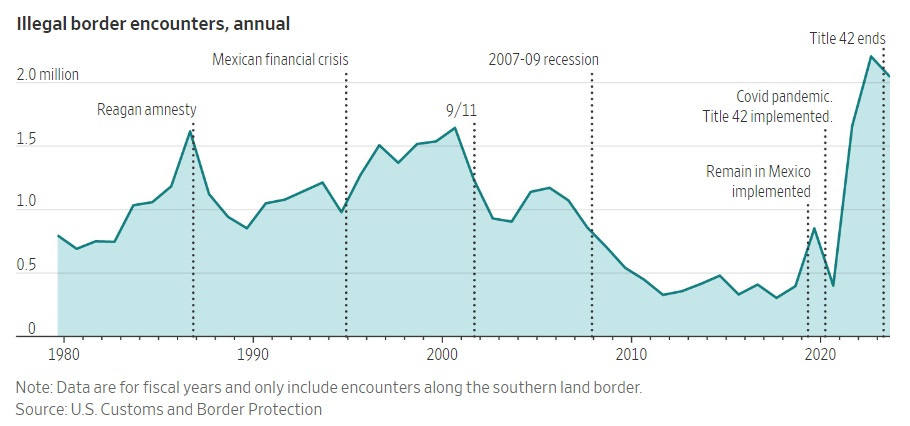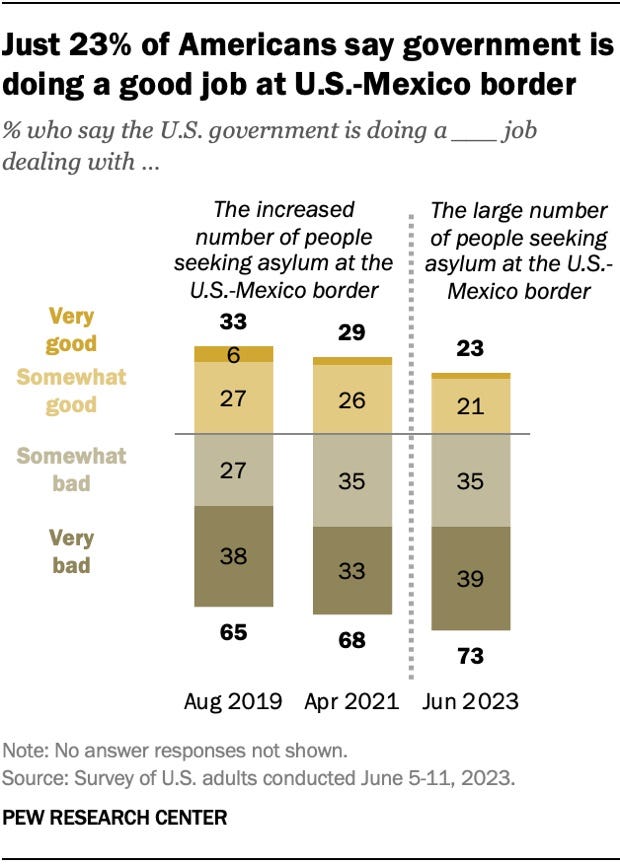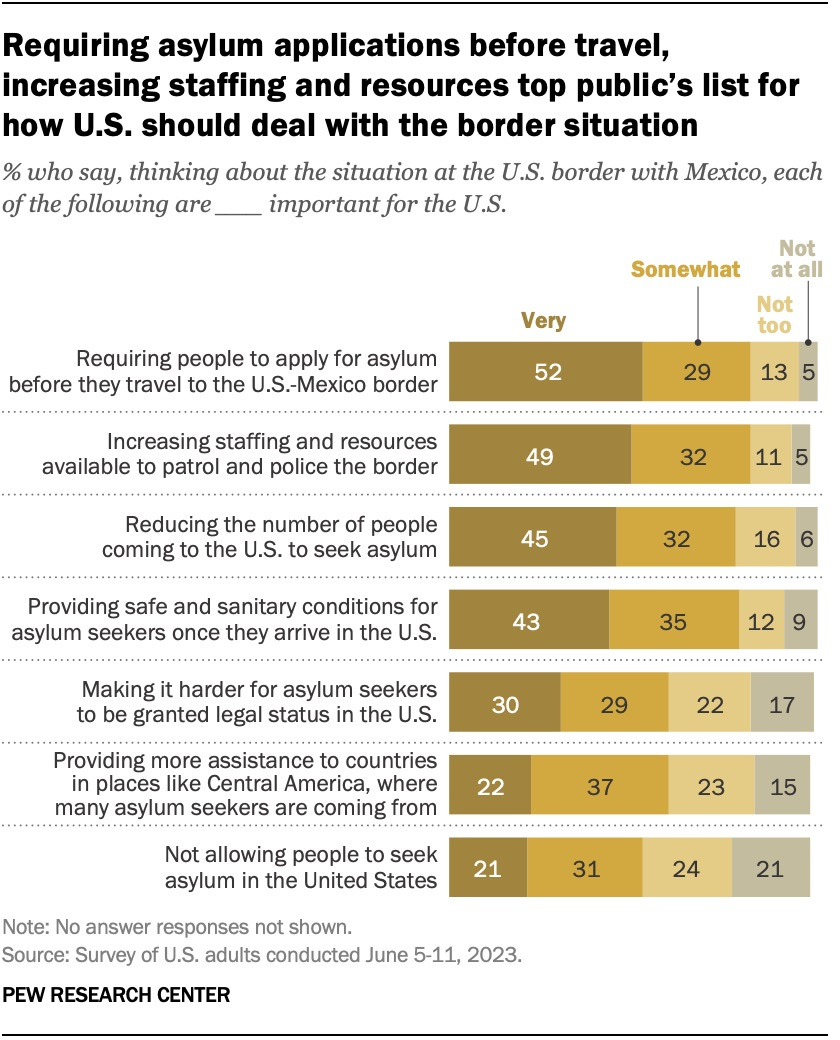Americans are angry about immigration
It's time to face this difficult fact, understand why it's happening, and deal with it.
The image above is a cartoon released around 1850 by supporters of the Know-Nothing Party, a short-lived American political party created to oppose immigration in the mid-1800s. (The name is supposed to indicate that the party was a secret society, not that its members were a bunch of ignorant fools, though on the latter point you can draw whatever conclusions you like.) The Know-Nothings represented one of America’s periodic anti-immigrant backlashes — others included the nativist backlash of the 1910s that led to the restrictive Johnson-Reed Act of 1924, and the 1990s backlash that led to a 1996 law making many immigrants ineligible for welfare benefits, and to the Secure Fence Act a decade later.
If you think the U.S. is always an open, inviting, immigrant-friendly place, think again. Usually it is; every backlash so far has eventually faded, and a permissive immigration system has returned. Our leaders, from George Washington and Thomas Jefferson to LBJ and Ronald Reagan, have almost always been a pro-immigrant bunch. Immigration is deeply ingrained in our national self-concept. But every once in a while, a sufficiently large number of Americans get the idea that immigration is a threat to our nation, and they take actions to limit that perceived threat.
Unfortunately, now appears to be one of those times. Anti-immigration sentiment collapsed during the Trump years, but has come roaring back under Biden:

And although Republicans, as you might expect, have driven much of this shift, you can see it among Democrats as well. 19% of Dems say immigration should be decreased, compared to only 12% who say it should be increased:

It’s a pretty salient issue too — along with the economy, the cost of living, and “poor leadership”, immigration is among the problems Americans consider most important right now.
And the issue is pushing Americans toward the Republican Party. Here’s NBC News from October:
[O]ur most recent NBC News poll shows Democrats with their largest-ever deficit on immigration handling…According to the poll, Republicans now enjoy an 18-point advantage on the question of which political party better handles immigration, with 45% of registered voters picking the GOP and with 27% picking the Democrats.
What’s striking about these numbers is that Democrats led Republicans on this immigration-handling question during the entire Trump presidency, for part of Barack Obama’s presidency and during the George W. Bush years.
So something HAS changed on this issue in Biden’s presidency[.]
Many other recent polls say the same thing.
So yes, we are in one of our anti-immigration moments right now, and the political impact could potentially be huge — the return of Trump, and all of the institutional chaos that will inevitably entail.
In the coming day, someone — probably on the political right — is going to draw a parallel between this attitude shift in the U.S. and events in Europe. The Netherlands just elected the party of the stridently anti-immigrant politician Geert Wilders, while in Ireland there have been nativist riots after an Algerian migrant stabbed some people. Although it’s hard to know for sure, it seems likely that the specter of large and occasionally violent pro-Palestine demonstrations by Muslims in European cities has touched off Europe’s traditional fear of the Middle Eastern “other”.
But America is not Europe. Unlike Europe, our Muslim population is small and tends to be high-skilled economic migrants rather than conflict refugees. American feelings toward Muslims have warmed substantially from the War on Terror era, and Islamophobia is deeply unpopular. Violent pro-Palestinian rallies in the U.S. are more likely to be blamed — correctly on non-Muslim leftists. And on top of all that, America’s anti-immigration turn came long before the Israel-Gaza conflict. So it’s a mistake to draw a connection between the European anti-immigration backlash and the American one.
So what’s causing the backlash in the U.S.? In two words: border security. A few years ago, the number of people the Border Patrol picked up trying to sneak into the U.S. was at a multi-decade low; since Biden took office, that number has exploded to unprecedented highs:
Historically high numbers of people are illegally entering the U.S., straining an immigration system already overwhelmed by the number of families coming across the border to request asylum…In the past, most migrants were single adults from Mexico looking for work. If caught by the Border Patrol, they could easily and quickly be deported.
Now, a fast-growing share are families with children, who are difficult to deport to their home countries. The change started around 2014 and has exploded in the past two years…After crossing into the U.S., they typically surrender to the first border agent they find…Smugglers encourage adults to travel with children, telling them they are likely to be quickly released into the U.S. because the Border Patrol doesn’t have the capacity to hold families for more than a day or two. Once released, they can wait years for their cases to be processed in clogged immigration courts…
Recently, a large number of people are coming from countries that have strained ties with the U.S., making deportations difficult or impossible.
And here is the WSJ’s graph:

Part of this dramatic explosion is due to the changing nature of how unauthorized immigrants interact with the Border Patrol; in the old days they’d try very hard to evade capture, but now they all turn themselves right in.
But the fact that huge numbers of people find it advantageous to sneak across the border and turn themselves in to the Border Patrol shows that something is deeply dysfunctional about our border system. As I wrote back in February, that dysfunctional thing is our asylum system:
The reason this is happening is because of asylum requests. The way U.S. asylum law works is that if you show up at the border requesting asylum, you’ll either have to wait a long time outside the U.S. for your request to be heard, or you’ll be denied entry outright. But if you manage to cross the border illegally and then turn yourself in to the Border Patrol, you’re on U.S. soil, so you’re legally entitled to request asylum. During the time that you’re waiting for your asylum hearing, you’re typically allowed to stay in the U.S. If you decide not to take your chances on the hearing, you can always not show up, and stay in the U.S. as an unauthorized (“illegal”) immigrant.
So basically, this technique — which I’ve begun to mentally refer to as “asylum-spamming” — allows people who cross the border illegally to A) jump the asylum queue and get way ahead of people who lawfully present themselves at a port of entry, B) stay in the U.S. for years while waiting for an asylum hearing, and C) have a backup plan of becoming an unathorized immigrant without having to spend effort dodging the Border Patrol. This sounds almost too good to be true, right? No wonder millions of people are doing it!
And this is exactly what’s making Americans so mad:

At this point, pretty much everyone in the country knows that the asylum system is the problem, and they want something done about it:

And before anyone rushes to blame racism for this sentiment, it’s useful to note that many polls indicate that Latinos in the Southwest support beefed-up border security.
I’m sure that the fact of a porous, chaotic border is itself sufficient to set many Americans’ alarm bells ringing. Americans are, generally speaking, very welcoming to immigrants themselves, but they also value law and order; they want the government to be able to dial immigration up or down according to the wishes of the citizenry, instead of standing helplessly by, paralyzed by a broken system, while foreigners treat U.S. institutions and laws like a joke.
But on top of that, there are economic concerns here that are perfectly legitimate. As an advocate for robust U.S. immigration, I’ve gone to great lengths to explain why immigration doesn’t tend to reduce wages or employment for the native-born — even for the least-educated and lowest-earning Americans. But there are economic harms that have nothing to do with wages and employment! One of these is fiscal costs.
Even after many immigrants were shut out of most government benefits in 1996, low-income immigrants still absorb a lot of taxpayer money. A 2016 report by the National Academy of Sciences found that the fiscal impact of immigrants without a high school degree is negative, even when you include the positive impact of their higher-earning descendants:
The reason is that even after 1996, there are still plenty of government services that even unauthorized immigrants are eligible for — education, health care, and so on. And of course that 2016 NAS report didn’t take into account the emergency housing services that have been deployed on behalf of the recent wave of asylum seekers. Providing that housing is overwhelming the budgets of border towns, and of the blue cities where many of the migrants have chosen to settle.
It’s the cost and inconvenience of these emergency services which is angering even many Democrats:
Remarkable polling results came out of New York…Even Democrats in this Siena College poll are saying things that sound somewhat reminiscent of the views of immigration hawks in the GOP:
Nearly as many New York Democrats said migrants coming to the state over the past 20 years have been a “burden” (35 percent) as said they have been a “benefit” (37 percent).
75 percent of New York Democrats said the recent influx of migrants to the state was at least a “somewhat serious” problem. Nearly half (47 percent) said it was a “very serious” problem.
53 percent of New York Democrats agreed with the statement that “New Yorkers have already done enough for new migrants and should now work to slow the flow of migrants to New York.” (The alternative was that the state should “accept new migrants and work to assimilate them into New York,” a position with which 41 percent of the Democratic respondents agreed.)
So we have a pretty darn good idea what the electorate is mad about — the flood of asylum-spammers — and why. The next question is what we do about it.
If you are a progressive activist who has basically decided that any sort of border enforcement is unacceptably bad — whether or not you explicitly think of that idea as “open borders” — then maybe your answer here is just to do nothing. Fine. But I see myself as a different kind of immigration advocate — I want sustainable immigration, which means that we need a system that doesn’t cause a restrictionist backlash. Currently, our system is causing a backlash, so I want to fix it, so that America’s fundamental pro-immigration attitude can shine through.
Donald Trump managed to stem the tide of asylum-spammers, even before Covid. He did this not with a border wall, but with a variety of policies that authorized the Border Patrol to expel asylum-seekers who illegally crossed the border, without allowing them to stay in America to await asylum hearings. Some of his policies involved expelling people to third countries, but most simply dumped the border-crossers back in Mexico. These policies were challenged in court, but then Covid came and allowed Trump to use public health authority to turn border-crossers back.
The pandemic is over, so that no longer works. Which means that if Biden actually wants to stem the asylum-spamming tide, he’s going to have to come up with new ways of turning people back to Mexico when they cross the border illegally. He is currently trying to do that, but it’s being challenged in court.
A more permanent solution would be to change U.S. asylum law to allow the Border Patrol to turn away anyone who crosses the border illegally, without letting them apply for asylum. This would probably be doable, because Republicans would vote for it. It would probably be popular, since it would fit Americans’ moral intuition that people should have to apply for asylum without breaking U.S. laws. And it’s probably the only way of putting a permanent and definite stop to the border crisis. The problem is that this would prompt a backlash from movement progressives, possibly weakening turnout for Biden in 2024. As is so often the case, it comes down to swing voters vs. the activist base.
But if Biden won’t do this, then Trump will. Or perhaps Trump will ignore legislative reform and simply defy the courts entirely, causing more institutional chaos and constitutional crises. But one way or another, if Biden loses in 2024 because the progressive base tied his hands on border security, that will not be a good thing for American immigration in the long term. Instead, it will be an invitation to a more general xenophobic backlash and long-lasting restrictions of the type implemented in 1924 — or worse.
As I see it, the goal of immigration advocates like myself shouldn’t be to simply engage in a short-term delaying action to frustrate any and every attempt to regulate the inflow of people. The goal should be to permanently and sustainably cement America’s status as a country that welcomes large numbers of immigrants. And that means stopping, or at least damping out, the cycle of immigration backlashes that often characterizes U.S. immigration attitudes. Right now we seem to be doing the opposite of that.






"... has touched off Europe’s traditional fear of the Middle Eastern “other”."
OK, maybe it's because I'm European but that sentence annoyed the hell out of me! Oh, Americans turning against immigration is all common sensical and reality based but Europeans doing the same is just them reenacting their Dark Ages traumas...
We have many of the same problems America faces re. asylum seeking, with a lot more landmass a lot closer to the flashpoints and we're starting from a significantly higher base of uneducated third world immigrants. And we don't have the dynamic US economy that helps digest the extra labor force. And, yes, last point is likely cultural - we are less favorable to change and immigration hasn't the same foundational imagery it has in the USA. But that's a relatively minor point compared to everything else.
And so, yes, sure, those Pro Palestinian protests in Europe reminded us we have literally millions upon millions of badly integrated Muslims from North Africa and Turkey and Syria, quite willing to bring their problems and their identity issues to our streets. And we're not enamoured with that. Would you be?
Finally a short, sharp explanation on a thorny but important subject.